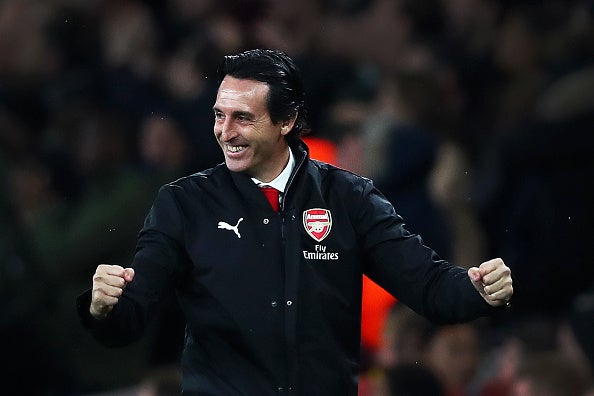We don't know how Unai Emery's Arsenal reign will turn out, but he's made them fun to watch and is already improving players
After they blew away Spurs, Jonathan Liew predicts a very watchable future for Arsenal


Your support helps us to tell the story
From reproductive rights to climate change to Big Tech, The Independent is on the ground when the story is developing. Whether it's investigating the financials of Elon Musk's pro-Trump PAC or producing our latest documentary, 'The A Word', which shines a light on the American women fighting for reproductive rights, we know how important it is to parse out the facts from the messaging.
At such a critical moment in US history, we need reporters on the ground. Your donation allows us to keep sending journalists to speak to both sides of the story.
The Independent is trusted by Americans across the entire political spectrum. And unlike many other quality news outlets, we choose not to lock Americans out of our reporting and analysis with paywalls. We believe quality journalism should be available to everyone, paid for by those who can afford it.
Your support makes all the difference.It was a derby that did for Unai Emery at Spartak Moscow. He had been in charge for just six months, and yet with the club languishing in seventh place and fans beginning to tire of their late collapses, the vultures were already beginning to circle.
A 5-1 thumping at home to their local rivals Dinamo Moscow was the final straw. After the game, the club’s owner Leonid Fedun marched into the dressing room, pointed at the manager, and - according to Aiden McGeady, who was playing for Spartak at the time - exclaimed: “Unai, finished!”
“I don’t care, whatever,” Emery said, walking out of the dressing room, only to surface a couple of months later at Sevilla.
To the extent that it is remembered at all, Emery’s time at Spartak is generally remembered as an abject failure. But one statistical quirk from his time there stands out: even when he left the club in mid-November, they were the highest-scoring team in the Russian Premier League, with 32 in 17 games. Emery had got Spartak firing at one end of the pitch. It was what was happening at the other that eventually cost him his job.
This fits the more general pattern of Emery’s career. Virtually wherever he has gone, his impact has been most keenly felt in front of goal. Valencia scored 68 goals in Emery’s first season there in 2008-09, compared to 48 the season before. In the space of a few months, Sevilla were converted from a team scoring barely a goal a game to a team scoring almost two. Even at PSG, where Emery inherited what was already one of the deadliest strike forces in Europe, he managed to sharpen it still further, increasing their count from 143 to 171 in the space of two seasons.
Now, just four months into his Arsenal tenure, the signs are that Emery is already beginning to unlock the immense attacking potential in the squad. Their resounding 4-2 win over Tottenham in Sunday’s north London derby was merely the most eye-catching example of a wider trend this season. With 32 goals in 14 games, Arsenal are scoring at a rate not seen for over a decade. With Pierre-Emerick Aubameyang leading the Premier League scoring charts, and Alexandre Lacazette making handy contributions from the bench, on current form there is a strong case for anointing Arsenal as the league’s best attacking team after Manchester City.
| Team | Points earned |
|---|---|
| Arsenal | 12 |
| Cardiff | 9 |
| Man United | 8 |
| Leicester | 8 |
| Brighton | 5 |
| Team | Goals after 45 mins |
|---|---|
| Arsenal | 24 |
| Man City | 21 |
| Chelsea | 18 |
| Liverpool | 14 |
| Everton | 13 |
Indeed, if they continue at their current rate, they will hit 87 goals this season, a tally not reached since Arsene Wenger led them to second place in 2004-05. And of course, this is the biggest question of all: whether Arsenal can maintain a scoring rate that the underlying analytics suggest might not be sustainable over the longer term. Currently, Arsenal are outperforming their expected goals by more than 50 per cent, which means that on the basis of where they’re taking their shots from, they’re either getting extremely lucky, or they’re finishing astonishingly well.
It could be both, of course. In Aubameyang and Alexandre Lacazette, Arsenal have two of the Premier League’s best pure finishers. Aubameyang’s scintillating first-time finish to level the game at 2-2 and Lacazette’s scruffy, deflected effort to put Arsenal 3-2 ahead were both redolent of a team currently finding more than one way to put the ball in the net.
But Arsenal’s attacking strength has been built on more than those two. Eleven players have scored in the league this season - the joint most - and virtually all of them are outperforming their xG. Arsenal are collectively scoring an obscene 17 per cent of their shots. If this is a flukey hot streak, then it’s one running through the entire squad.
On the other hand, the evidence of Emery’s career suggests Arsenal’s upturn in attacking fortunes may not be entirely accidental. This is, after all, a coach who has been around the block a few times, and knows that the best way of getting disillusioned fans excited again is by giving them entertainment. “For me, the individual goal-scoring statistics are very important,” he explained earlier this season. “Scoring goals is important for this spectacle.”
| Team | Conversion Rate |
|---|---|
| Arsenal | 17.1% |
| Man City | 15.9% |
| Tottenham | 13.9% |
| Bournemouth | 13.8% |
| Brighton | 13.2% |
| Team | Different goalscorers |
|---|---|
| Arsenal | 11 |
| Chelsea | 11 |
| Man City | 11 |
| Liverpool | 10 |
| Man United | 10 |
Perhaps this is why, for all the talk on his arrival that he had been hired to offer defensive stability, Emery is first of all a coach who likes to let his team off the leash.
After all, organising a defence, managing the spaces, drilling co-ordination: all that takes time. For most young players, on the other hand, attacking expression is more or less instinctive. “He’s just given me confidence to express myself and believe in my ability,” said Alex Iwobi in a recent interview with The Guardian. “In training, he’s always letting me try new things: be positive, be direct and prove it in games.”
You could argue, of course, that wherever he has been Emery has inherited excellent attacking players. Villa, Silva and Mata at Valencia. Negredo, Navas and Rakitic at Sevilla. Cavani, Di Maria and later Neymar and Mbappe at PSG. But in many ways, his skill - and it is a highly valuable one in today’s marketplace - has not been in unearthing good players but in getting existing good players to play just a little better: making a little tactical tweak here, a little word of encouragement there, fine-tuning his maestros to an orchestral pitch.
In the longer term, of course, Emery will surely need to diversify Arsenal’s appeal. Injuries, a run of poor form, teams accustoming themselves to Arsenal’s attacking patterns and movements: all these could ultimately thwart their progress and turn greater focus onto that undercooked defence. Whether they have the nous and the solidity to launch a genuine top-four challenge remains to be seen. But whether they rise or they fall, it’ll certainly be worth watching.
Join our commenting forum
Join thought-provoking conversations, follow other Independent readers and see their replies
Comments